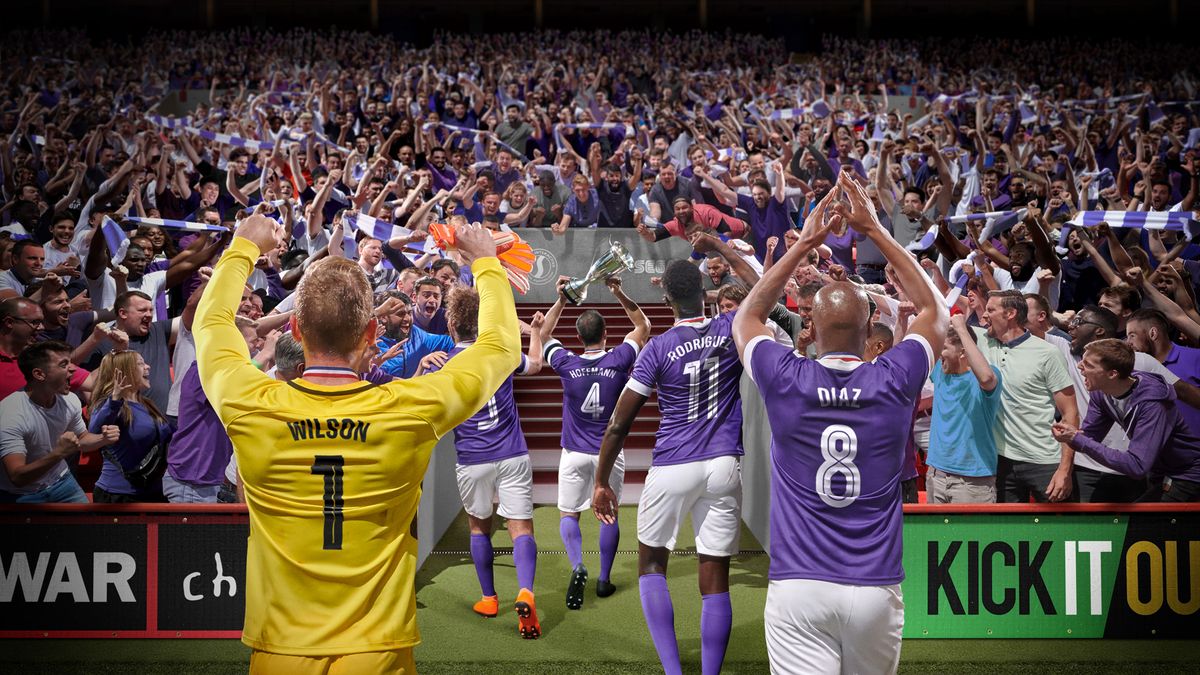GamesRadar+ Verdict
Football Manager 2020 continues the series' winning formula, but there's still plenty of aspects that need work alongside overpowered tactics and methods to win games.
Pros
- +
Club Vision is ideal for long-term managers
- +
Development Centre makes looking after youth players much easier
- +
Match engine has subtle but needed graphical enhancements
Cons
- -
Gegenpress is still very overpowered
- -
Strikers can't score one-on-ones but can score 30+ yard screamers
- -
Press conferences are still dire and have been for years
Why you can trust GamesRadar+
Some games simply have a winning formula and don't need to iterate much year on year, and Football Manager is one of them. If you compare Football Manager 2020 to Championship Manager 00/01, there's clear and obvious improvements across the board. Compare this instalment to last years game? Progress will only be noticed by those who sink in 200+ hours and have a career spanning multiple seasons because at its core, this is still the same old Football Manager.
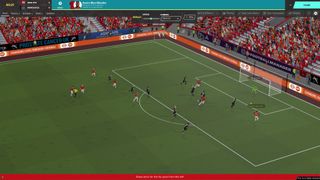
What this essentially means is that if you haven't been drawn in to the depth and detail provided by the management simulator, this iteration isn't going to be the release that changes your mind. There's certainly been some quality-of-life improvements that make the experience more manageable for newcomers, like breaking down all the possible staff responsibilities so you can be in charge of as much or as little as you choose, but FM20 is all about keeping it entertaining for players who live and breathe the game.
As someone who only picked up last year's title in April yet still managed to play for almost 400 hours over six months – seriously, I was hooked – playing the FM20 beta has added just enough to get me excited about starting a brand new career in the full launch. There's only so much you can do with the game of football, so while franchises like Call of Duty may introduce jetpacks to shake up the core gameplay, Football Manager is limited to being exactly that; football.
Features for the long-term manager
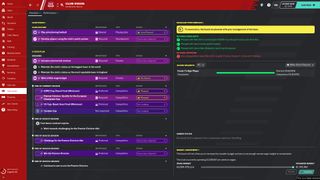
One of the most enticing new features that will keep you playing for years and years in-game is the Club Vision. When you start a new job now, the board will present you with their ideal five-year vision, broken down per season. For example, if you take over at Manchester United – a club slowly on the decline but fighting to re-enter the top four – they want you to develop players using the club's famous youth system, play entertaining football, and by the end of the current season you need to qualify for the Champions League and reach the final of the Europa League.
Take a look at the future seasons and by the end of the 2022/23 season, the board wants the club to have won the Premier League. A manageable target for United 10 years ago, but is it too lofty for the club in its current state? Compare this to a smaller club but one that's on the rise like Fleetwood Town in League One and they want you to sign players under the age of 22 for the future, and are looking for simply a top half finish in the league this season.
While it may feel like added external pressure to play a certain way, having the Club Vision also acts as guidance to ensure you're on track and not running the risk of losing the board's trust. You can also see the notable highlights and criticisms of your performance as manager, so you know exactly what aspects of your game have been working in your favour, and which you need to start fixing. If you're not winning, there's going to be a whole lot of red.
Developing youth products
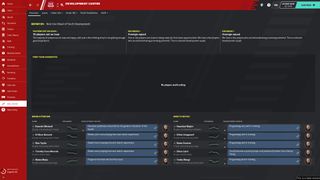
A new feature that works in tandem with the Club Vision is the Development Centre. Unless you're owned by an oil tycoon like Manchester City, utilising your homegrown youth prospects is crucial to success, and it's now much easier to track their development with useful graphs and charts detailing their progress. Alongside all of your youth teams, you can take a glance at your players out on loan, the youth candidates once the youth intake happens during the season, and even your youth team staff.
Over time, you'll start introducing your top youth prospects into your first team squad to give them more game time and experience, but that's when the Development Centre starts to fail. For some reason, as soon as you promote a player to your first team squad, they're removed from the Development Centre, making it much harder to track their progress again.
Rather than segregating the players in this area of the menus by their squad, it should simply do it by age. I don't need to know how my 30-year-old Alexis Sanchez is developing on loan at Inter Milan because he's started to decline anyway, but I do care about 18-year-old Mason Greenwood's development as I'm starting him in most cup matches with a number of substitute league games to accelerate his ability.
Persistent drawbacks still exist
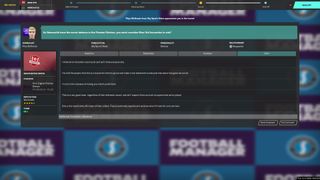
Numerous aspects of the game are due some much-needed TLC, but have been largely forgotten about for the last few years. I love the idea of press conferences where the answers you give can shape your team's morale and start feuds between other managers – and while that is possible – the back and forth question-and-answer sessions quickly become very repetitive and same-y thanks to the lack of variety in the answers available.
I've still got a number of bugbears with FM20 however, and most are issues that aren't new to this instalment. Shouts – basic commands you can yell from the touchline – are still largely ineffective, with a couple of exceptions. "Get Creative" usually elicits a positive response, as does "Praise" when the team is playing well. Sometimes "Show Some Passion" and "Demand More" prove fruitful, but god forbid you tell your team to "Push Forward" or "Calm Down". You're just asking for complacent or frustrated behaviour then.
Overpowered (and underpowered) mechanics
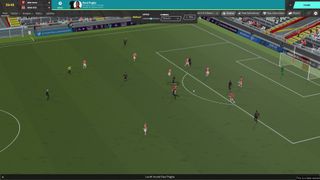
It's worth remembering that at the time of writing, I've only played the FM20 beta. Review copies of the final build weren't provided in advance so while patches will most likely fix any issues with the match engine, certain aspects of play are incredibly overpowered. The biggest culprit is long shots; since I've been playing as United it may be exaggerated thanks to Paul Pogba, but scoring multiple screamers from outside the box per game is the norm, instead of such wild goals being few and far between.
On a similar note, players in one-on-one situations with goalkeepers almost never score. For every one-on-one scored, you see five long shots fly in from 30+ yards out and while everyone loves a good thunderbastard, it's hardly realistic or what you'd expect to see from a simulator that prides itself on being accurate.
Just like last year, there's one tactic that still feels staggeringly better than any others too, and it's the return of the Gegenpress. Popularised by current Liverpool manager Jurgen Klopp, this high-intensity method of pressing to win the ball back as soon as you lose it with swift counters was by far the best tactic to use in FM19, and it still is this time around. It's impossible to test this with every team in the game, but after using it for a few matches with a number of clubs at different tiers, the Gegenpress is still rather good.
It's a shame that resorting to tactics that work in the engine rather than learning the ins-and-outs of your squad and familiarising yourself with players' preferred roles and instructions is the most effective way of getting results. By all means you can still do that and avoid using the Gegenpress if it's not how you want to play football, but knowing that using such a tactic is almost guaranteed to provide results makes it hard to resist.
Football Manager has never been at the top of the game when it comes to animations and visuals; to most, the game is a series of glorified spreadsheets with some dots moving around a green rectangle during matches. The 3D match engine has received some subtle upgrades however, with smoother animations, less goalkeeping mistakes, weather effects on the pitch, more intelligent runs from players off the ball, improved goalkeeper distribution, the list goes on.
Like I mentioned before, Football Manager is simply a winning formula. It's hard to not recommend the game to people who already know they enjoy FM, because the minor features added to the game like Club Vision and Development Centre make it even more enjoyable and immersive for someone who plays for 5-10 seasons or longer. The problem is that if you're unsure whether you'll like FM and you're looking for a hyper-realistic simulator, FM19 is a better shout until some of the issues are patched. FM20 is brilliant, it truly is, but it's not quite as brilliant as it could be and arguably, should be.
Give me a game and I will write every "how to" I possibly can or die trying. When I'm not knee-deep in a game to write guides on, you'll find me hurtling round the track in F1, flinging balls on my phone in Pokemon Go, pretending to know what I'm doing in Football Manager, or clicking on heads in Valorant.

The devs of a legendary indie Zelda-like have a new retro action game with "bumpslash" combat, and its Steam Next Fest demo is a gem: "Fans of Ys, take note!"
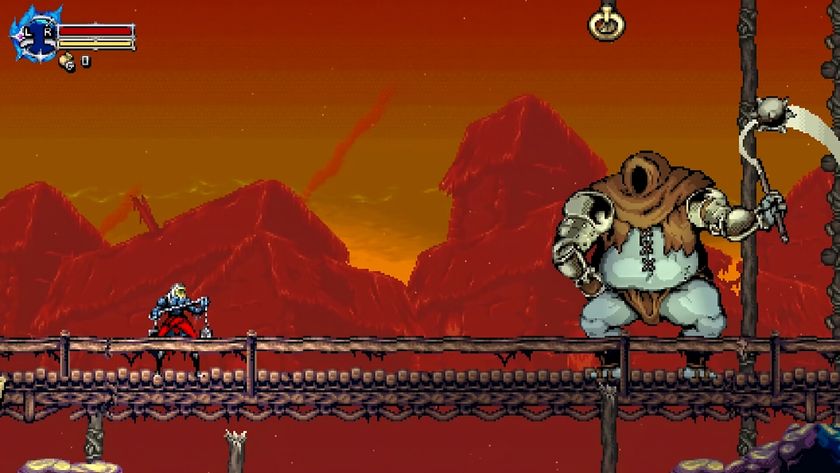
And you thought Hollow Knight: Silksong is late – 37 years in the making, this retro Metroidvania has a whip-smart Steam Next Fest demo that's as Castlevania as it gets

Razer has launched its Kuromi Collection in the US so I've turned my cozy gaming setup into a pretty purple Sanrio paradise
Most Popular



